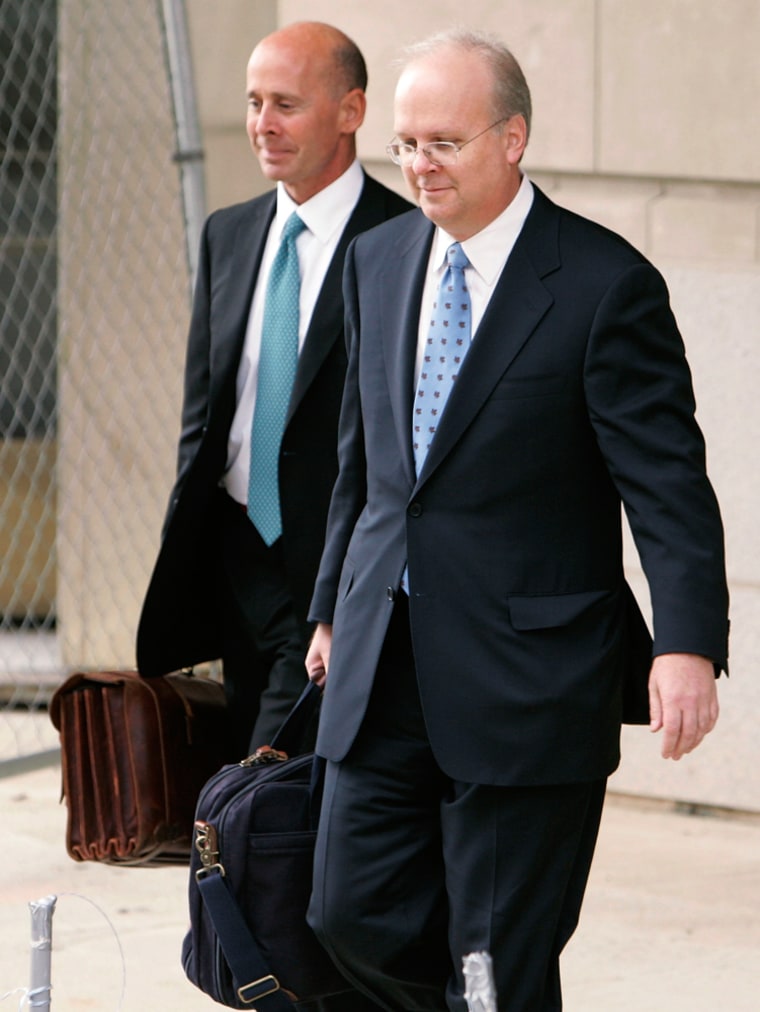It could be a rough week for President Bush, with two key White House aides facing the possibility of being indicted in the investigation into the leak of a CIA operative’s name and Supreme Court nominee Harriet Miers bracing for more tough questions from senators.
Even Vice President Dick Cheney has come under scrutiny, sources familiar with the investigation told the Bloomberg News Service.
The special counsel, Patrick Fitzgerald, has questioned current and former Bush administration officials about whether Cheney was involved in an effort to discredit the CIA agent’s husband, Iraq war critic and former U.S. diplomat Joseph Wilson, according to the Bloomberg report.
Fitzgerald could decide within days whether to bring charges over the leak of CIA operative Valerie Plame’s identity. Cheney’s chief of staff, Lewis Libby, and President Bush’s top political adviser, Karl Rove, were among the possible targets, legal sources said.
Citing legal and Bush administration sources familiar with the thinking, Time magazine reported Sunday that Libby and Rove have made plans to step aside or resign if they are indicted.
After initially promising to fire anyone found to have leaked information in the case, President Bush in July offered a more qualified pledge: “If someone committed a crime they will no longer work in my administration.”
Some potential charges
While Fitzgerald could try to charge administration officials with knowingly revealing the identity of an undercover operative, several lawyers in the case said he was more likely to seek charges for conspiracy and easier-to-prove crimes such as disclosing classified information, making false statements, obstruction and perjury.
Fitzgerald could also decide no crime was committed.
Wilson alleges that White House officials outed his wife, damaging her ability to work undercover, in order to discredit him for accusing the administration of twisting intelligence to justify the Iraq war in a New York Times opinion piece on July 6, 2003.
Legal sources said Rove could be vulnerable to a perjury charge for not initially telling the grand jury he talked to Time magazine reporter Matt Cooper about Plame.
Rove’s attorney, Robert Luskin, brushed aside speculation about Fitzgerald’s intentions, saying, “Rove has at all times strived to be as truthful as possible and voluntarily brought the Cooper conversation to Fitzgerald’s attention.”
Libby could be open to false statement and obstruction charges if his testimony contradicts that of New York Times reporter Judith Miller and if the prosecutor concludes a private letter Libby sent to Miller was intended to influence her grand jury testimony, lawyers and other sources involved in the case said.
Miller’s lawyer sees ‘big case’
“Fitzgerald is putting together a big case, and he’s looking for little pieces of a puzzle,” Robert Bennett, Miller’s attorney, said on ABC’s “This Week.” Miller, who spent 85 days in jail before agreeing to testify, published an account of her grand jury testimony in Sunday’s New York Times.
“Much would depend upon what Mr. Libby said to the grand jury. If he said that he had not talked to Judy about these things or didn’t talk about the wife, then he’s got a problem,” Bennett said.
Libby discussed Wilson’s wife with Miller as many as three times before columnist Robert Novak publicly identified her as Valerie Plame, a CIA operative on weapons of mass destruction, Miller wrote in her account in the Times.
Miller disclosed Saturday that the notebook she used for an interview with Libby in July 2003 contained the name ”Valerie Flame,” a clear reference to Plame. But Miller told Fitzgerald she did not think Libby was the source of the name and that she could not recall who gave her that information, according to her account in the Times.
Bennett said it was not clear from Miller’s testimony whether or not Libby shared with her classified information.
Libby letter scrutinized
Sources said Libby could be in legal jeopardy over one sentence in a Sept. 15 letter he sent to Miller while she was still in jail. In that letter, Libby urged Miller to testify about their conversations and noted that other reporters had made clear to the grand jury that “they did not discuss Ms. Plame’s name or identity with me.”
Miller wrote in the Times that part of Libby’s letter surprised her ”because it might be perceived as an effort by Mr. Libby to suggest that I, too, would say we had not discussed Ms. Plame’s identity.”
“Yet my notes suggested that we had discussed her job,” Miller said.
Bennett called Libby’s reference to the testimony of other reporters “very troubling.”
“Our reaction when we got that letter, both Judy’s and mine, is that was a very stupid thing to put in a letter because it just complicated the situation,” Bennett said.
Libby’s lawyer, Joseph Tate, has not returned calls seeking comment.
But in an e-mail to the Times on Friday, Tate called Miller’s interpretation “outrageous.”
“I never once suggested that she should not testify,” Tate wrote. “It was just the opposite. I told Mr. Abrams that the waiver was voluntary.”
“‘Don’t go there’ or ‘We don’t want you there’ is not something I said, would say, or ever implied or suggested,” Tate added.
Miers heads back to Senate
On a second front, the president’s Supreme Court nominee was headed back to Capitol Hill Monday to meet with more members of the Senate Judiciary Committee.
Miers is scheduled to meet with Sens. Dianne Feinstein, D-Calif., and Charles Schumer, D-N.Y.. Both voted against confirming John Roberts as the court’s chief justice.
Feinstein said she remained open to voting to confirm Miers, citing in part concerns raised by conservative Republicans. “The way she’s being beaten up by the far right is very sexist. People should hold their fire and give people an opportunity to come before a hearing,” Feinstein said Sunday on CNN’s “Late Edition.”
Miers is also expected to turn in the committee's 12-page questionnaire this week, possibly as early as Monday.
